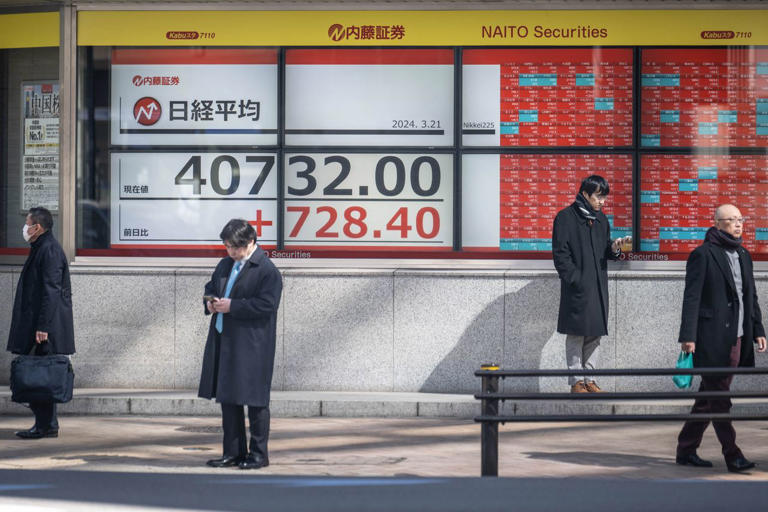After experiencing a remarkable surge to record highs, Japanese stocks may be facing a period of diminishing catalysts in the near future. The Nikkei Stock Average, the benchmark index, recently surpassed the 40,000 mark for the first time ever, driven by factors such as robust earnings growth, a weakened yen, and improvements in corporate governance practices, including increased share buybacks. With an impressive 21% gain in the first quarter, the index emerged as the best-performing major market globally.
However, as the market enters the second quarter, analysts suggest that much of the positive news has already been priced in, rendering it more susceptible to potential disappointments in the short term. Fumio Matsumoto, chief strategist at Okasan Securities, warns that investors may have become overly optimistic regarding expectations for further earnings growth, share buybacks, and inflation. Matsumoto notes that recent strength in corporate results was influenced by factors such as the recovery from the pandemic, while the surge in share buybacks follows a period of limited repurchases during the Covid era. Additionally, the resurgence of inflation, after years of low or negative price gains, is attributed partly to external factors.
While Matsumoto does not foresee an economic shock, he cautions that the market’s optimism could lead to adjustments if outcomes do not align with expectations, potentially resulting in increased downside volatility. Okasan Securities forecasts that the Nikkei Stock Average will close the year at 36,700, with the index recently closing slightly higher at 39,838.91.
The market experienced some turbulence at the beginning of the week following the release of the Bank of Japan’s quarterly corporate survey, which indicated a deterioration in sentiment among large Japanese manufacturers for the first time in a year.
Masayuki Kubota, chief strategist at Rakuten Securities, highlights the deteriorating U.S. economy as the most significant risk to Japanese stocks. Lower interest rates in the U.S. would likely lead to a stronger yen relative to the dollar, potentially impacting Japanese corporate earnings negatively.
However, analysts maintain a positive outlook for Japanese stocks in the longer term, citing the return of modest inflation as a driving factor. Unlike previous instances of false economic recoveries, the current environment indicates a departure from deflationary pressures. Signs such as plans for significant pay raises by big companies and rising land prices reflect this shift. Additionally, the Bank of Japan’s recent departure from its negative interest rate policy signals confidence in the emergence of inflation in Japan.
